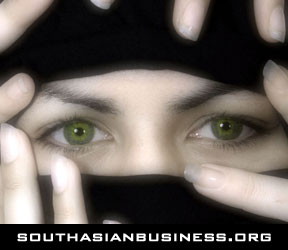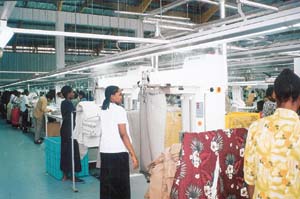
| HOME | EXPORT & IMPORT |TEXTILE ACTS | RESOURCES | DIRECTORY |SITE MAP |
|
World view: my sparkly pumps and cotton dress were cheap and won't last, but they are part of a "Chinese tsunami" that is sweeping through world markets
It's nothing to do with his fashion sense, you understand. But while his old colleagues back home were worrying about the election, the EU trade commissioner had a much longer-range and potentially more serious problem on his mind--the rapid rise of cheap Chinese exports. Since quotas on textile exports were lifted on 1 January, the world trade in garments has been hit by what some are calling "the Chinese tsunami". Chinese garments are irresistibly cheap; European and American importers are buying more and more. The figures are staggering. In the first quarter of this year, exports to Europe of nine types of Chinese garment--including pullovers and men's trousers--shot up 400 per cent. The US commerce secretary, Carlos Gutierrez, says Chinese garment exports to America are up 1,500 per cent since 1 January. Before then, each country had a quota it could export, so places like Bangladesh could sell their garments overseas even though similar products from China would be cheaper. The price was kept artificially high. Yet with the end of quotas, factories in those countries have been forced to close, because no country can compete with China. No wonder Mandelson and Gutierrez are squealing. In Portugal, production of T-shirts has dropped by more than 30 per cent. US textile manufacturers say more than 16,000 American jobs have been lost this year because of Chinese imports. Mandelson knows those jobs are never coming back. "The transition has to be managed. We have to make it smooth," he said at a trade conference in Jordan in late May. Chinese attempts to mollify Europe and America by imposing a new tariff on garment exports from 1 June are not likely to make much difference. Chinese exporters are expected to absorb the tax by marginally increasing prices or further reducing labour costs. So Europe and America are playing King Canute by threatening sanctions if China doesn't limit its garment exports. In the short term that may have some effect. China is playing a long game--if you know you will be king of the jungle in the end, there is no point in angering the old lion while it still has a little muscle behind its roar. Chinese companies will move some production back to other countries, and the government may "manage" success a bit more tactfully, possibly revaluing its currency, the yuan, now pegged to the US dollar and thought by economists to be undervalued by as much as 40 per cent. That, as much as low labour costs, is what's making Chinese exports so cheap. [ILLUSTRATION OMITTED] In the end, however, China will prevail. The country entered the World Trade Organisation in 2001 as a "non-market economy", a definition that allows other WTO members to raise protectionist barriers for 15 years on the premise that cheap Chinese goods are being "dumped" and "disrupting the market". But that provision will lapse if China is accepted as a market economy sooner. With such a promise ahead, China is unlikely to allow disagreements to turn into trade wars, but will use WTO mechanisms for resolving disputes. Almost unnoticed by those who don't read the business pages, China is going global, gliding quietly into all areas of the world economy. In December, its largest computer manufacturer, Lenovo, spent $1.75bn (about [pounds sterling]1bn) on acquiring IBM's global PC businesses. Now Lenovo is moving its headquarters from Beijing to New York. The Shanghai Automotive Industry Corporation backed out of the Rover deal because the British carmaker was a dead duck, but it will buy another, more profitable car company when it can. China already has several multinational corporations. With economic power come political influence and international clout. Other developing countries see a model in China, one built on economic liberalism and authoritarian rule. How much more tempting for most governments than all that guff about human rights and democracy preached by Europe and the United States. As China invests around the globe, it extracts promises of support in the UN and other international forums. The US economy depends on China, not just for cheap clothes, but because Beijing is using its excess dollars to buy US treasury bonds. My sparkly shoes cost $20 ([pounds sterling]11). The cotton jersey dress was a little more, but that was a mark-up in a trendy boutique. Both will fall apart pretty soon, because they're cheaply made. The economy that produced them won't, and the economy that imported them had better look out. |
Copyright 2025 Southasianbusiness.org All rights reserved.
|

 British Airways lost my luggage on the way to Philadelphia last week, so I was forced to go shopping for clothes. As I browsed the "outlets" in the malls, riffling through cheap cotton dresses and fashionable sparkly sequinned pumps, I found myself thinking about Peter Mandelson.
British Airways lost my luggage on the way to Philadelphia last week, so I was forced to go shopping for clothes. As I browsed the "outlets" in the malls, riffling through cheap cotton dresses and fashionable sparkly sequinned pumps, I found myself thinking about Peter Mandelson.